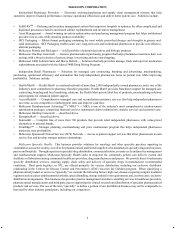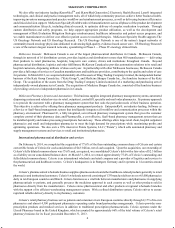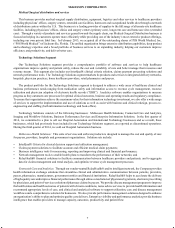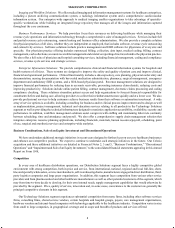McKesson 2014 Annual Report Download - page 18
Download and view the complete annual report
Please find page 18 of the 2014 McKesson annual report below. You can navigate through the pages in the report by either clicking on the pages listed below, or by using the keyword search tool below to find specific information within the annual report.
McKESSON CORPORATION
15
Changes in the Canadian healthcare industry and regulatory environment could have a material adverse impact on our results
of operations.
The provincial governments in Canada provide partial funding for the purchase of pharmaceuticals and independently regulate
the sale and reimbursement of drugs. Similar to the United States, the Canadian healthcare industry has undergone significant
changes in recent years in an effort to reduce program costs. For example, the Ontario government significantly revised the drug
reimbursement system with the passage of the Transparent Drug System for Patients Act. In recent years, to reduce the cost for
taxpayers, various provinces took further steps to reform the rules regarding the sale of generic drugs. These changes include the
significant lowering of prices for generic pharmaceuticals and, in some provinces, the elimination or reduction of professional
allowances paid to pharmacists by generic manufacturers. These reforms may adversely affect the distribution of drugs as well
as the pricing for prescription drugs for the Company’s operations in Canada. Other provinces are considering similar changes,
which would also lower pharmaceutical pricing and service fees. Individually or in combination, such changes in the Canadian
healthcare environment may significantly reduce our Canadian revenue and operating profit.
Changes in the European regulatory environment regarding privacy and data protection regulations could have a material
adverse impact on our results of operations.
In Europe, we are subject to the European Union (“EU”) data protection regulations, including the EU Directive on Data
Protection, which requires member states to impose minimum restrictions on the collection and use of personal data that, in some
respects, are more stringent, and impose more significant burdens on subject businesses, than current privacy standards in the
United States. The EU regulations establish several obligations that organizations must follow with respect to use of personal data,
including a prohibition on the transfer of personal information from the EU to other countries whose laws do not protect personal
data to an adequate level of privacy or security. In addition to this EU-wide legislation, certain member states have adopted more
stringent data protection standards. The costs of compliance with, and other burdens imposed by, such laws, regulations and
policies that are applicable to us may limit the use and adoption of our products and solutions and could have a material adverse
impact on our results of operations.
Our foreign operations subject us to a number of operating, economic, political and regulatory risks that may have a material
adverse impact on our financial condition and results of operations.
We have operations based in, and we source and contract manufacture pharmaceutical and medical-surgical products in, a
number of foreign countries. The Company’s acquisition of Celesio significantly increases the importance of our foreign operations
to our future operations and growth.
Our foreign operations expose us to a number of risks. Operations outside of the United States may be affected by changes
in trade protection laws, policies and measures and other regulatory requirements affecting trade and investment; changes in
licensing regimes for pharmacies; unexpected regulatory, social, political, or economic changes in a specific country or region;
changes in intellectual property, privacy and data protection; import/export regulations in both the United States and foreign
countries and difficulties in staffing and managing foreign operations. Political changes, labor strikes, acts of war or terrorism
and natural disasters, some of which may be disruptive, can interfere with our supply chain, our customers and all of our activities
in a particular location. We may also be affected by potentially adverse tax consequences and difficulties associated with repatriating
cash generated or held abroad. Additionally, foreign operations expose us to foreign currency fluctuations, including uncertainty
regarding the Euro, the Canadian dollar, the British pound sterling and the Brazilian real, that could adversely impact our results
of operations based on the movements of the applicable foreign currency exchange rates in relation to the U.S. dollar. Since
substantially all of Celesio’s revenues are generated outside of the United States, the Company’s acquisition of Celesio significantly
increases our exposure to these risks.
Foreign operations are also subject to risks of violations of laws prohibiting improper payments and bribery, including the
U.S. Foreign Corrupt Practices Act, the U.K. Bribery Act and similar regulations in foreign jurisdictions. The U.K. Bribery Act,
for example, prohibits both domestic and international bribery, as well as bribery across both private and public sectors. An
organization that fails to prevent bribery committed by anyone associated with the organization can be charged under the U.K.
Bribery Act unless the organization can establish the defense of having implemented adequate procedures to prevent bribery.
Failure to comply with these laws could subject us to civil and criminal penalties that could have a material adverse impact on our
financial condition and results of operations.
























